A Former CIA Analyst Explains Why Denuclearization Is Crucial to Stabilizing U.S.-Russia Relations
In this episode of “Scheer Intelligence,” host and Truthdig Editor in Chief Robert Scheer talks with Melvin Goodman. Photo courtesy of Melvin Goodman
Photo courtesy of Melvin Goodman
RS: Hi, it’s Robert Scheer, and welcome to another edition of Scheer Intelligence, where the intelligence comes from my guests. In this case, Melvin Goodman. And I can’t think of a more relevant guest to have at a time when U.S.-Russian relations are so tense, and our president [laughs], our conservative president is being considered a Russian simp. And I have Melvin Goodman, who’s spent much of his life in government analyzing Russia. He worked first of all in the, he did his service in the military, and did coding and decoding. And then he went to work for the CIA for 24 years as an analyst, and to the State Department, analyzing the old Soviet Union, figuring out what was going on. He was an adviser in the SALT arms control talks and so forth. One of the most highly regarded experts on the Soviet Union. And then after 24 years at the CIA and the State Department, he went to the National War College, where he taught for 18 years and had guests come in from the CIA and elsewhere to speak. And he’s written a very interesting book, and I don’t know that the title is the best for it, but it’s “Whistleblower at the CIA: An Insider’s Account of the Politics of Intelligence.” It’s a City Lights book. You’re not really a whistleblower, you’re a guy who served a long time in the government as a loyal participant in the process.
MG: And then became a dissident.
RS: But you only became a dissident when you left.
MG: Well, that’s not true. I became a dissident within the building, within the institution, in the 1980s, fighting William Casey and Robert Gates, who were politicizing intelligence on behalf of Ronald Reagan. So from 1981 to 1986, I was a contrarian and a dissident, and when I testified against Robert Gates in 1991 when he was nominated to be the CIA director, I think I became a whistleblower. A whistleblower to me, by definition, is someone who’s trying to correct something that’s wrong. I have a very simple definition of whistleblowing.
RS: OK, but if I have somebody working for me at Truthdig and they want to correct something that’s wrong, I would reward them with a bonus.
MG: What if they took it to the Senate Intelligence Committee and said you were incompetent and you were deceitful and you had dissembled? Then what would you say?
RS: [Laughs] You’re enjoying this much too much, Melvin Goodman.
MG: When you get to write a book like this, then I think you should have a little bit of enjoyment.
RS: OK. But my point is that — you know, and you in the book raise questions about what do we mean by “whistleblower,” as well as what do we mean by deep state. And I think what’s interesting, among many other points you raise in the book, is actually people — you were doing your duty. You were there as an analyst, you were supposed to — after all, you mentioned in the book, Harry Truman when he set up the CIA, converted it from the OSS, the whole idea of the CIA was to provide objective analysis of data. It wasn’t supposed to do spying or to do regime change or kill people. It was actually to figure out, by going through all of the secret data we had of any kind and any source, what’s going on in the world. That’s what Truman wanted — what’s happening, according to your book. And —
MG: Well, I had the note in Harry Truman’s hand where he clearly states, I do not want, I did not want a cloak-and- dagger organization. And he was very critical of Eisenhower and Kennedy for turning the CIA in that direction. Eisenhower in 1953, with Operation Ajax to overthrow the democratically elected government of Iran; and of course the signal that was given to the CIA to take out Lumumba — they didn’t assassinate him because Belgian security and intelligence got to Luumba before the CIA did. And then, of course, Kennedy follows up in 1961 with the stupidity of the Bay of Pigs, which the CIA itself called in its review “the perfect failure.” And it was exactly that. But it was moving the CIA in that direction that led Truman to write an op-ed for The Washington Post in December 1963, and then before he died in an oral interview with Merle Miller, he said: If I knew then what I know now, I wouldn’t have created the CIA. So, yes, I believe in the CIA as an intelligence institution, and maybe I was naive when I joined in 1966 thinking that the CIA was the greatest classified library I had ever encountered. But I went there to do the work of intelligence, and for 15 years, I thoroughly enjoyed it.
RS: Right. And you mentioned Kennedy also distorted or changed, perverted, the purpose of the CIA, and you know, had the Bay of Pigs and what have you. But it was Kennedy who, at least it’s attributed to him — I’m not quite sure how accurate the sourcing is on this — that after the Bay of Pigs, he said he wanted to break the CIA into a thousand pieces.
MG: Well, that’s true. And when he called in the CIA director Allen Dulles, he said you know, if this were a parliamentary democracy, I would have to resign after the Bay of Pigs. But it isn’t, so you’re going to have to resign. And that caused him to be extremely suspicious of the CIA, which has happened to other presidents.
RS: Let me ask you about suspicion. I know you hate conspiracy theorists, and as a journalist I don’t like them either, because for my definition a conspiracy theorist is a person who doesn’t do his or her homework, and doesn’t actually do reporting and worry about fact and logic. So I’ll go with you on that. But David Talbot has recently written a book — and he’s a terrific analyst; he’s the founder of Salon magazine — on Allen Dulles. And he argues in there — it’s not the main point of the book; it’s a very good overview, I think, of the CIA and its predecessor– but Allen Dulles is a really scary figure. And he had a lot of resentment against Kennedy, and at one point David Talbot said, what an improbable pick for someone to be on the Warren Commission to figure out how, what happened to Kennedy, why was he assassinated and what was the real story. Did that bother you at all?
MG: I thought it was a terrible choice. Allen Dulles was a terrible CIA director. I thought he was incompetent. He wasn’t known for great intelligence. He wasn’t the brightest of the Dulles brothers and sisters. The sister was–
RS: John Foster [Dulles] was the Secretary of State, yeah–
MG: — the sister was the brightest.
RS: Oh, OK.
MG: Ah, but Allen–
RS: We have to, for people who don’t know all this history, there was a moment in America where our foreign policy officially was run by John Foster Dulles, and then Allen Dulles ran what some people referred to as the beginning of the deep state. But it was certainly a secret operation, beginning with the OSS recruiting Germans to be on our side after the war, and other things. And then he ended up being head of the CIA. And when you mentioned the overthrow of the government in Iran, which a lot of people, myself included, feel that’s where the major disturbance–
MG: That’s where it all started.
RS: — that’s where it all started, was a CIA operation. It’s interesting. I actually interviewed Kermit Roosevelt, the guy who was assigned to do it, and I interviewed him for the L.A. Times when he was recuperating from an operation in a hospital. I did it by phone, at his wife’s suggestion, I might say. And he laid open the whole thing about how they went in, created this turmoil, and overthrew, yeah, Mohammad Mosaddegh, and called him an agent of Russia, when he was nothing of the sort. He was a nationalist.
MG: He was a nationalist, but to the left of center, and to the Kennedy administration and the Eisenhower administration, anything left of center was bad. And Kennedy was no different than Eisenhower on that regard. The way they looked at the Third World was, if you couldn’t control the leader in a Third World country, then you’d have to oppose that leader. And it didn’t matter if it was left or right, and that was true for both Eisenhower and Kennedy.
RS: You know, one of the things I like about doing these interviews is I can learn and encounter unexpected things. So let’s stop that for a minute, that’s not where I was going to go. But I’d like to talk about that comparison of Eisenhower and John Kennedy. There are people, one of them’s Oliver Stone, whom I respect a lot, but he always has this position — Kennedy would have stopped the Vietnam War. Kennedy was better. Kennedy– you know. And my own inclination is to be much more pro-Ike. I actually wore a button as a kid in the Bronx, if you want to know one of the most dangerous, reckless things I’ve ever done.
MG: I was “Madly for Adlai” at that time.
RS: Yeah, I’m sure you were — and I was a kid running around with an “I Like Ike” button in the Bronx, where I don’t think we ever met a Republican. And I liked Ike for the same reason that I.F. Stone, the legendary journalist, liked him. He understood war. He, as it turns out from the record, was opposed to dropping the atomic bomb in Japan, two bombs. And he ended up bringing Khrushchev to the United States, he ended up embracing détente, he did resist a land war in Asia, he did resist the invasion of Cuba — it came under Kennedy. And I wondered, in your, as somebody who’s studied the record from the inside — you were already, well, you were close enough to these events to have access to the CIA records and the history, because that’s what you were doing as an analyst. And actually, Eisenhower, I think, turned out to be more of the peacenik than JFK.
MG: Well, on one level he certainly was a peacenik — on the level of strategic operations, I think. He tried to reduce the defense budget, he didn’t fall for Pentagon propaganda, and only weeks before he left the White House, he sat around in the Oval Office with his leading supporters and said: God help the United States when the people who follow me into the Oval Office do not know how to understand the military, how to deal with the military. And I got this from his brother, Milton Eisenhower, who was the president of the university I was attending at the time, Johns Hopkins University. And actually, if Eisenhower had followed through with his original design, the famous military-industrial complex speech would have said “military-industrial-Congressional complex.” And when Milton asked his brother Dwight why didn’t he leave in “Congressional,” he said: It was enough to take on military and industry. I couldn’t take on the Congress too, but that’s where the problem is. Eisenhower knew and understood the international arena. John F. Kennedy, as far as I was concerned, was clueless about the international arena. But with the Bay of Pigs, when he learned he was lied to by Allen Dulles, he was lied to about the force that that CIA was putting together, then he turned really hostile toward the CIA. Vietnam — I don’t think there’s any real proof of what Kennedy would have done. Frankly, I don’t think he had the balls to do what Lyndon Johnson did. What Lyndon Johnson did was outrageous, and totally wrong, and immoral in my estimation. But it took a lot of political chutzpah to do what Lyndon Johnson did. John F. Kennedy was a much weaker figure, and I think he would have turned back. He never would have gone to 500,000 troops in Vietnam. But he’s the one who started us down this road. He’s the one who believed the mythology about the Sino-Soviet conspiracy, which was already breaking up in the early 1960s, which CIA intelligence analysts understood. And it’s ironic to me that the president who understood this the best turned out to be Richard Nixon, which is how you got the strategic triangle that Nixon and Kissinger put together to build closer relations with Moscow and Beijing than Moscow and Beijing had with each other. So Nixon understood the international arena in a way Eisenhower started to understand and Kennedy misunderstood.
RS: Well, let’s talk about that now. Because there’s a new mythology, a new Cold War against Russia. A lot of liberal, enlightened people, even those who objected to the old Cold War, now have reinvented Putin, who has disavowed communist ideology. If anything, he embraces the Russian Orthodox Church and capitalism of an oligopolistic model. But nonetheless, we have an enemy again, and it’s being ballyhooed everywhere as an explanation for all of our problems. And the irony here is that under Trump, people have been put in power who like having enemies, and they like having Russia as an enemy. Ultimately, they are at war with Trump himself, in that they represent the kind of new, neoconservative push in the administration.
MG: Well, if Trump was serious about improving relations with Russia, and —
RS: And should he be? Should he be, by the way?
MG: I think he should be serious. There are too many areas of mutual interest that are much more important than most of the differences we have with Russia. When you look at arms control, disarmament, counter-terrorism, nonproliferation of strategic weaponry, the Iran situation, the North Korean situation — the United States and Russia are completely in agreement in those areas. But if Trump were serious, why did he turn around and place generals such as Flynn or McMaster, or certainly Mattis, or Kelly at Homeland Security — why are they in these key positions that civilians should be occupying? All of them are anti-Russian and anti-arms control. And Trump himself is clueless about arms control. It came up in his first conversation with Putin when Putin brought up extending the START treaty, the Strategic Arms [Reduction] treaty. And Trump had to get off the phone for a few minutes to turn to his advisers and ask, what is that treaty that he’s talking about. He was told, and he went back on the phone, of course, and said this is a miserable deal and we’re not going to continue it. So Trump is clueless about major areas of strategic substance, yet next month, we’re told now, Trump is working very hard to schedule a very formal meeting with Vladimir Putin. Now I, on the one hand, think that’s a very good idea. We’ve got to get the dialogue back. Remember, it was the United States that missed this strategic opportunity, and not Russia. If you go back to 1991, when the Soviet Union fell apart — and my wife and I did a book on Shevardnadze, the Soviet foreign minister. I interviewed both Shevardnadze and James Baker. And they told me the same story: that the United States said to the Soviet foreign minister, and to Gorbachev, for that matter, that if they pulled their 380,000 troops out of East Germany, we wouldn’t leapfrog over East Germany to go into Eastern Europe. And that’s exactly what we did. So I blame Bill Clinton for the expansion of NATO, taking in former Warsaw Pact countries. And I blame George W. Bush for bringing in former members, or former republics of the Soviet Union itself. And if it hadn’t been for Angela Merkel — and thank God for Angela Merkel — I think Bush would have made the move in to bring Georgia and Ukraine into NATO. And certainly we were manipulating the situation in both Ukraine and Georgia, which led to the short war between Russia and Georgia that I blame the Georgians for. And I blame the United States for thinking we would give them some backing. So demonizing Putin, one, is wrong. As Kissinger said, demonization is not policy. And two, Putin isn’t responsible for all these problems that we’re having now in bilateral relations. So how do you get the dialogue back? How do you institutionalize this dialogue? And where is the national security bureaucracy that Trump is going to need to put this into play? It’s not there. You have a secretary of state who’s an amateur in these things, who has no staff. He has no assistant secretaries, he doesn’t have serious deputies under him, he doesn’t seem to have any standing with the administration whatsoever when it comes to foreign policy. And then when you look at the National Security Council, it’s one of the weakest councils we have ever had. This is not like the days of Kissinger, when you had outstanding experts like Helmut Sonnenfeldt and William Hyland in key positions. The people are not in place. And remember, systems don’t do these things. People do these things. We count on individuals, and we count on people with some institutional memory. This is an administration with no institutional memory whatsoever. It’s incredibly pathetic, but if you read The New York Times and The Washington Post, they keep telling you that he’s picked moderates in the national security positions. These aren’t moderates! These are general officers with their own pet rocks, and one of these pet rocks is anti-arms control, and the other pet rock is anti-Russia. So it doesn’t add up, it simply doesn’t compute.
RS: [omission] …I’m speaking with Melvin Goodman, former CIA insider — that’s an underestimate, the guy who worked for the CIA as an analyst for 24 years, specializing in the old Soviet Union, and author of a new book about the agency, “Whistleblower at the CIA.” You were there for the SALT negotiations, and for those who haven’t studied it in school, let me explain. There was a recognition that the mutual assured destruction policy was a disaster, that we needed some significant arms control, that we couldn’t be at razor alert, sharp alert. And we now are reminded of that, because we have a president who can make a decision in short order on an airplane to destroy all life on this planet, and so can his Russian counterpart. Everybody forgets that Russia is a country that has half of these, or almost half of these, nuclear weapons, and we have almost half of the other half. And one of the things that’s interesting to me, and I want to get to your basic point here about the Trump administration, but I have spent my life as a journalist writing about these things. And there’s been no shortage of intelligent ex-CIA, or even current CIA people. Even somebody who’s been made fun of, General Lansdale, who was actually the guy who got us into the Philippines and then into Vietnam and so forth — I once took a long walk with him around Washington after he was — he still was in the White House, with Food for Peace or something. Well, he had it all figured out. He knew it was all a mess. This was early! You know, in the early sixties he told me, this is a disaster, I hope they don’t send any troops there — and he was the guy who was sort of the architect of the original involvement. And over the years, I would interview people in this country, in Washington, elsewhere who were in the government. And they, almost without exception, the inside analysts knew what was going on and were smart, you know? And you, of course, are our prime example. The question is —
MG: Let me say one thing about this. The reason why the analysis was right was because the intelligence collection was so good. And the interesting thing to me, that I don’t think is properly understood, is when you have intelligence failure, there are no intelligence failures due to collection. They’re due to the failures of analysis, a lack of imagination, a lack of rigor, a lack of looking at alternative assumptions or alternative judgments. And that goes back to before the CIA, the Pearl — Pearl Harbor is a classic example. We had the intelligence to prevent Pearl Harbor. We had the intelligence to prevent 9/11. And then you have politicization, where you have phony intelligence, the 1980s under Ronald Reagan, the defense buildup that wasn’t needed because the Soviet Union was coming apart. And then you get to the run-up to the war in Iraq in 2003, and I was calling journalists and making the pitch that there were no weapons of mass destruction. And there were a few of us who understood that, and we were very active talking to journalists. But journalists bought the government line. In 2003, we engaged in the worst foreign policy decision any president has ever made, and we’re still paying for it, if you look at the apocalyptic situation of the Middle East now. But the collection of intelligence that this government engages in is quite overwhelming. And I must say, I miss it.
RS: So tell me about the Trump administration in your view, and the mass media’s view of Putin. Because right now, this is this theater of the absurd, in my mind, that the liberal side is now the pro-war side. They’re belligerent, they want to get the foreign enemy, they want to — Trump has used the word “witch hunt,” but they’re certainly going after any connection, business or otherwise, that anyone had with Russia. And you would think we’re back in the old days of the Cold War. And you said something earlier, I want you to return to it. You said these generals are not of that sort, they’re not commie simps. [Laughs] Tell us about these generals, because you taught at the War College for 18 years, you —
MG: I taught at the War College for 18 years. There were at least three students of mine who went on to become chairmen of the joint chiefs. I took a group of 20 officers to the Soviet Union and then Russia every year for 18 years. And it was kind of interesting, because not one of them had ever been to the Soviet Union or Russia before. They all had formulated a position based on, basically, agitprop — agitation and propaganda — that they received as part of their training as military officers. I mean, this is the way we train our military officers: to be anti- communist, to be anti-Soviet, to be anti-Russian. And it was interesting to get to the reaction of these officers, when they got there, to see the pathetic economic and social conditions that prevailed in the Soviet Union. And they felt they had been had by their own military. They realized: This is the other superpower? This is really the enemy? Now, it didn’t mean they were going to become less anti-Russian, but it did mean they began to question some of the propaganda, at least, about Russia. But if you look at your typical military officer, particularly at the general level, a general officer, they’re anti-arms control, anti-disarmament, and anti-Russia. And what we need to do with Russia, the first thing we need to do is to continue the program of denuclearization that was essentially started, in principle, by Eisenhower, talked about in the 1950s. And the bravest thing John F. Kennedy did was to take on the military with the Partial [Nuclear] Test Ban Treaty. But presidents, even Reagan, who was so contemptuous toward the Soviet Union in his first term, began to accept the importance of arms control thanks to a wise secretary of state, George Shultz. But now you have a president who knows nothing about arms control, he knows nothing about disarmament, and he has surrounded himself with general officers who are anti-arms control, anti-SALT. And when you think of the damage George W. Bush did by abrogating the ABM Treaty — the ABM Treaty was the cornerstone of strategic deterrence. You know, without defense, then you could reduce offensive weapons. With defense, which doesn’t work — and now there was an editorial in The Wall Street Journal this morning about the need to expand national missile defense — there’s no bigger hoax in the security arena than national missile defense. I did a book on that, “The Phantom Defense.” You know, our obsession with the Star Wars nonsense — it doesn’t work, it’s never worked, we’ve been throwing money at it since the 1950s, but you still don’t have a system that can tell the difference between a nuclear warhead and a decoy. So there’s so much that needs to be done, we don’t have the people in place to do it.
RS: You know, it’s interesting. We’re going to wind this up right now, but you just wandered into an area that I know a lot about. And I interviewed Edward Teller one day. I was in this arms control group with Sid Drell, one of the famous physicists and expert on arms at Stanford, and Condoleezza Rice before she was secretary of state, within that group. And I was on my way up to a meeting out there, and met Teller on the airplane. And I was writing about Star Wars defense that influenced Reagan to think that this could work. And as we got off this plane, PSA, now Southwest, in San Jose, Teller — who was a friendly chap — he said, Bob, you know, you’re going up there to see Sid Drell and the arms control, get Sid to tell you about the great results we just had on the cottage test. And I wasn’t supposed to know the cottage test, what it was about. They were named after cheeses. And I said, what do you mean? He said, well, we got lasing, we know how to do it, we can use the X-ray laser and shoot down these weapons. So he was — this goes to the deep state question — he was selectively leaking information to a journalist. I was working for the L.A. Times. That was at that moment one of the biggest, if not the biggest, secrets you could release if it was true. It would have changed everything. A laser could shoot down all these incoming missiles. It would change the whole nature of defense in the nuclear weapon era. And it turned out — and I don’t think he was lying, I just think he was misinformed, because it turned out that the heat in the experiment had distorted it, and so then they had to say, no, they didn’t get lasing and therefore Star Wars didn’t have a breakthrough. But I just remember the ease with which he told me that secret, darkest secret information — that’s what they were routinely doing. And the people that worked in the classified area on the highest level would routinely give information that was secret when they wanted to influence a story one way or another. Now, in the current moment, we’re getting a lot of that. We’re learning, what is Putin about, and what is happening in Syria, and what is going on there — the whole narrative is being shaped by people who are revealing secret information to us. They’re disgruntled, or they’re in government, they want to push it in a direction — I would ask you, isn’t this a dangerous moment? Because the people you count on in this society, people who care about arms control, diplomacy or understanding the other side or so forth, now are — mostly Democrats — are fiercely urging Trump to be tougher on the Russians.
MG: Well, I think Trump has created his own problem with so much deceit about the connections with the Russia situation. You look under any rock these days, and there’s a Russian angle. So why has the attorney general lied about contacts? Why did the former national security adviser lie about his contacts with Russia? Why is Trump trying to ignore the entire problem of Russian hacking? Which was genuine — there’s no doubt in my mind. I’ve talked to too many people who have knowledge of the situation. It was clear that Russia was hacking into Democratic and Republican National Committee websites. And how that material got to Assange, probably we’ll never know, but WikiLeaks received it, basically, through some false flag operation that emanated from Russia. In terms of leaking, remember that the United States is a ship of state that leaks from the top. It doesn’t leak from the bottom, it’s always leaked from the top. When Kissinger was national security adviser he had his reporters, Richard Burt of The New York Times, who he used to leak to directly. Zbigniew Brzezinski did the same thing when he was national security advisor for Carter. That’s why 90 percent of what you read in the mainstream media is what the government wants you to read. Today, I think the press is trying to catch up. I think The Washington Post and The New York Times are doing a fantastic job in reporting information I think the public needs to know. This is a time of incredible uncertainty, a time of cover-up, a time of obfuscation, and we need to have this kind of material in our hands. It’s not threatening to our strategic security. One of the reasons why I wrote this book was I felt, with 42 years of knowledge, 42 years of a security clearance, I think this is — I’m sharing information that the American public needs to understand about the mechanics of our national security bureaucracy. And I think right now we face an extremely difficult situation in which both truth and trust have been challenged, and we’ve got to get back into the lanes of truth and trust. So I don’t look at myself as a whistleblower. I look at myself, to a certain extent, as a truth-teller. And that’s why, when Sally Yates testified on May 8 and Jim Comey testified on June 8, to me, they were truth-tellers, and they were sharing very important information.
RS: So, finally, a prediction. Trump meets with Putin. They work out something. Won’t he be under tremendous pressure to be hawkish and not conclude an agreement on anything, be it Syria, be it arms control? Isn’t the pressure of the moment to be so deeply suspicious of Putin’s intentions that he has to show — and this has always informed the Cold War in the past — he has to show that he’s tougher. This was the pressure on Kennedy, it was the pressure on Johnson. He said: I have to be tougher than Goldwater. Isn’t that the current dynamic?
MG: Well, it could be. That’s your traditional dynamic. But there’s nothing traditional about Donald Trump. I mean, his narcissism has to be taken into consideration when you look at the way he will handle a personal situation. And I think national leaders now have the advantage of an intelligence operation that he has provided, which is his Twitter account. I think they know how to manipulate Donald Trump. I think that’s what happened in Saudi Arabia. I think that’s what’s happened with a lot of authoritarian leaders. And remember, Putin is a classic authoritarian leader. This is Russia that we’re talking about. we’re not talking about a democracy. We’re talking about a strong Russian nationalist who wants to improve relations with the United States. I think that is genuine. He needs that for his own security predictability. The Russians think in terms of five-year tranches when they look at national security decision-making. And to think about the next five years with some strategic stability, they have to have a stable relationship with the United States. Now, if Trump does understand this, it means he has some leverage. And how he uses it will be another matter, but I don’t think he’s bothered by the opposition he’s getting from the mainstream media or pundits generally. He has someone like Steve Bannon, who’s selling him on the importance of dealing with Russia, and he’s still saying very nice things about General Michael Flynn, who I think is in great legal jeopardy, who consider Russia the key to solving the problem of the Islamic State in the Middle East. So he’s going to manipulate that and send the prodigal son-in- law off to Jerusalem to negotiate something between the Israelis and Palestinians, and I think this is the great thing that we’re seeing out of Donald Trump.
RS: That’s it for Scheer Intelligence. Thanks to my guest Melvin Goodman, author of “Whistleblower at the CIA: An Insider’s Account of the Politics of Intelligence.” The producers of Scheer Intelligence are Josh Scheer and Rebecca Mooney. Our engineers at KCRW are Kat Yore and Mario Diaz. See you next time.
—Posted by Emma Niles
Your support matters…Independent journalism is under threat and overshadowed by heavily funded mainstream media.
You can help level the playing field. Become a member.
Your tax-deductible contribution keeps us digging beneath the headlines to give you thought-provoking, investigative reporting and analysis that unearths what's really happening- without compromise.
Give today to support our courageous, independent journalists.
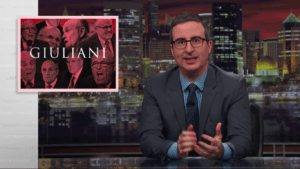
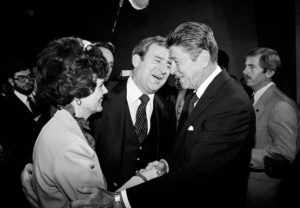

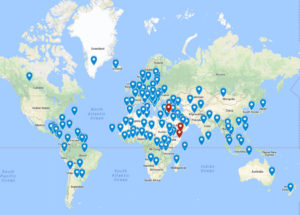
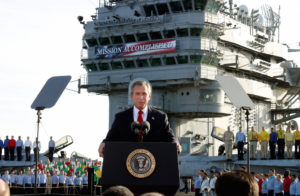
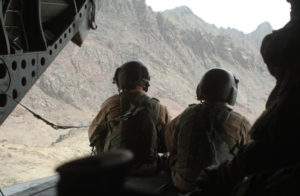
You need to be a supporter to comment.
There are currently no responses to this article.
Be the first to respond.